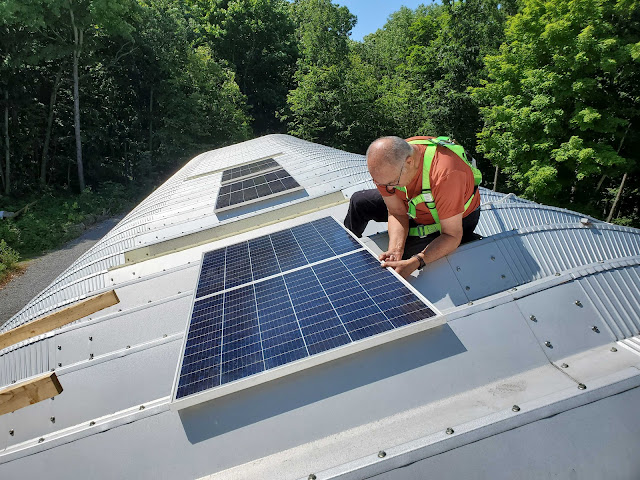(More) Solar Panels, Roof Edition
The new battery, that
was the subject of a recent post, has an update (naturally).
The lithium battery installed in 2021 has made it through a full year, including a winter, and is operating perfectly. During the winter, we just shut things down entirely, and the battery held a decent charge for the four months we were away from the lake.
And in any case it
doesn't matter if lithium batteries freeze, a huge plus for our climate and the
lack of access in the winter time here.
Now we are back in residence at the lake and enjoying the lack of fiddling that this new set up allows. On a typical sunny day, it reaches full charge before noon; after that it cycles between 87% and 90%. The battery is large enough that it is not necessary to keep it at 100%. Usually we use about 15-20% of the battery capacity during the time there is no charging - more or less from 6PM to 8AM.
We have had to run the 24 volt generator only twice since we installed the new battery, confirming that the lithium battery charging is much more efficient than charging a lead acid battery.
Bob can't help but collect data - here is a screen shot of a little monitoring window he wrote in python (another project of course):
The program runs on a
computer attached to the system, that he can access via the internet. The program also logs a bunch of data every
minute – he doesn’t use it for much but it is in his DNA to check some details
from time to time.
This year, to enhance the new system, we installed 8 new 330 watt panels on the roof of the garage, bringing our total to about 5000 watts. This was a sort of combined project. Bob did all the work on the roof and I did all the worrying part on the ground. A perfect shared responsibility. For anyone interested, he did wear a fall arresting harness and found that the biggest hazard was tripping over the rope.
Installing the panels
on the roof involved a bunch of new wiring, then some Rube Goldberg additions
to the tractor to get the panels to the roof.
With these extra
panels, we now have enough energy to meet our domestic needs and to recharge
Barb's Toyota RAV4 Prime, giving the car about 70KM range. That is enough to get to Kingston and while
it is unlikely that one could do an economic justification, it feels pretty
good.
A side benefit is
that even on cloudy days we harvest enough with the larger array to meet our
daily needs, so, with luck, we can stop having propane delivered for the
generator.

.jpg)








Comments
Post a Comment